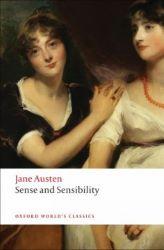
Sense and Sensibility follows two sisters, Marianne and Elinor, who have been left destitute following their father's death. Marianne is an impulsive romantic who chases love wherever it will lead her. Elinor is logical and socially conscious, and hides her turbulent emotions even from those closest to her. Together, the two of them will survive scandal, family drama, and first loves in an attempt to find the prized middle ground between passionate expression and silent intelligence.
This is not the best Jane Austen novel. I've only read about one and a half of her other works, but I can guarantee anyone that this is not the best Jane Austen novel. My main problem with this work is that it has all the drawbacks of a Jane Austen classic (slow pace, meandering conversations, way too many characters) with none of the expected romantic investment.
There's still a lot of great stuff about this book. The best thing for me was the main character, Elinor. Elinor is the character through which we sees the story, which has a lot of benefits. It makes her sister's antics more endearing and impactful. It makes her romantic situation more sympathetic, which it needs. It also makes the book much more interesting, because Elinor is an amazing character! She's funny in the best, most sarcastic way possible. She's observant and intelligent, so its great to watch how her mind works. She deeply loves the people around her, and gives everyone new dimensions. She is what makes this book special. The other benefits, I'd say, is the general humor in the writing, the drama of the story, and the sustained level of tension.
The thing I don't like about this romance novel is that it doesn't do what its supposed to do: create a compelling romance. Both sisters have romances that both end somewhat in tragedy, which is supposed to be very sad and moving. This works a pretty well with Marianne, since her situation involved a lot of deceit and drama that was very fun to read. It does not work at all with Elinor. Elinor's love interest is present for very little of the novel, and is so boring that I already forgot his name for this review and wouldn't have remembered it while reading the book if Elinor didn't think about him so often. And she does think about him a lot, which doesn't make sense to the audience, since he's offered so little of himself as a character to be a compelling love interest. This wouldn't be as big of a problem if romance wasn't the central pivot of the book, but as it stands it's distracting to see the intelligent, charismatic lead longing after someone the audience couldn't care about less.
All in all, this book is still very good, and worth a read! I'd recommend this to anyone who likes regency romance, interesting female lead characters, moving emotion, and lots of drama!
Reviewer Grade: 12
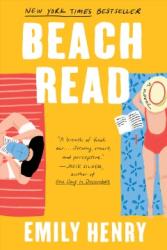
Emily Henry is an author whose work I've enjoyed, so Beach Read was on my list right away. The story follows January and Augustus, two accomplished novelists and college rivals, who become neighbors and work together to overcome writer's block caused by their resurfacing trauma. They challenge each other to new genres and experiences and definitely don't fall in love along the way. January is a fun character to read about during her most embarrassing and romantic moments, despite each situation being exaggerated so much that it felt silly. Augustus' personality was a little bland and I wished there was an actual reason for them to become enemies instead of the overused misunderstanding trope. However, the message of valuing family despite their faults and taking a leap of faith for the sake of your individuality is important. I'd say this book isn't life-changing, but good to read if you can relate to any struggles with parental relationships or feeling obligated to stay in a relationship that is just average.
Grade 12
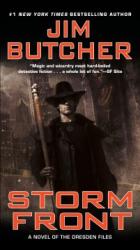
Storm Break follows Harry Dresden, the only wizard-for-hire in the country, as he investigates a grisly murder that could only be done by dark magic. Along the way, he'll have to juggle the case of an abandoned wife, the demands of his only friend in the force, the pressures of a sentient skull, and the condemnation of a council that wants to end him once and for all.
I didn't give this book three stars because it's a decent book. I gave this book three stars because it does some things really, really well and some things really, really badly. Throughout my reading, my internal rating jumped between one and four stars, so I stuck with three because it was mostly a good book and two stars should be reserved for boring books. And this definitely wasn't boring.
On the good side, I enjoyed the world building. It remains typical enough to the urban fantasy realm to seem cozy without being boring. Every magical creature has the exciting things we're used to, with some extra thrown in for fun, and lots of personality to make up for any stereotypical writing. The creatures and world building sell the danger of the world, making the stakes very high in the first book, something I appreciate. I like the main character, Harry Dresden, because he's a funny guy. I mean funny in that he cracks actually funny jokes, as well as funny as in he doesn't ever think things through and the outcome is always hilarious. I also like how the Harry has a "sad hidden backstory", but its not really hidden or sad because he talks about it so matter-of-factly that you forget how messed up it is in context. I loved the mystery of the novel, even if some twists threw me for a loop. The writing could also be surprisingly emotional for whats meant to be a cynical cop novel, in a way that really makes you sympathize with the twisted situation the protagonist is in, as well as the innocent people wrapped up in it. The ending was very satisfying and climactic and well bought, and really kept me invested until the end. Basically, its a very good urban fantasy novel with a fascinating protagonist and a thrilling story!
Now for the really, really bad stuff. Or just one really, really bad thing. In short: the author of this story has no idea how to write women. Or, he knows how to write women, and he just chooses to do it in the worst way possible. Every single woman in this book is one of three things: desperate for help from the dashing protagonist, incredibly attractive for no reason and really into the protagonist, or a token "strong independent woman" who devolves into one of the other two types within chapters. And I cannot stress how jarring this was. The author can write witty dialogue and fantastical creatures and heart wrenching emotion, but he can't write a single female character without sexualizing or demeaning her in some way. It's like walking through a local art gallery full of beautiful landscapes and self portraits, and then out of the blue there's a two-year-old's finger painting. I could go on for hours about how bad it was, and I really want to, but basically: about half of the women in this book are prostitutes, about half of the women die horribly and helplessly, most of them hit on Dresden and he always assumes its to seduce him for nefarious purposes, and not a single one of them has more than a shred of autonomy, character, or soul. All of that had to go into the main character, who is amazing alone, but whenever he's around woman he feels like a gross power fantasy that I can't sympathize with until about ten pages after he shares a conversation with a female character.
All in all, this book is a frustration. I want to enjoy the world building and fun characters and funny moments and good plot, but every so often a woman is introduced and I have to resist the urge to track the author down and throw the book at his face. If you can suffer through that, there is some great writing to be found! If you can't, I don't blame you.
Reviewer Grade: 12
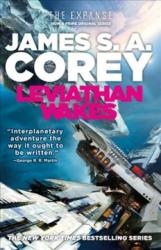
Leviathan Wakes is set in a time where humanity has reached the edges of the solar system, desperate to grow past the confines of Earth. Jim Holden is on a ship meant to drag ice from asteroids when he discovers a secret that kills most of his crew and puts the rest of them in horrible danger. Detective Miller has just been assigned to a throwaway missing persons case that is far more than it seems. The two men will find their stories colliding in a way that could either create a new, starward path for humanity...or end it for good.
This was one of the first serious, in-depth science fiction books I've read in a long time, since those types of books usually wear me out. But this one blew me away. The first surprise was the world building. Most science fiction has complex world building, its a staple of the genre. But this was beyond insane world building that still stuck itself between the lines, in small observations or bits of daily life. It hardly ever had to derail the story to go in depth about the mechanics of this world, but by the end my brain was still clogged with what felt like endless information about this fascinating future for humanity. The second surprise was in the characters. No one felt like a staple science fiction character. Detective Miller at first seemed like the stereotypical sad grizzled cop, but the complexity of his character blew everything I was expecting out of the water. Jim Holden at first looked like the paragon leader type, but he often gets things wrongs or makes bad choices in a way that still endeared us to his endlessly moral character. The side characters also deliver, with memorable personalities and motivations. The third surprise was in the plot. It starts slow, meandering its way through the characters, but then it takes off like a shot. There will be huge chunks of action and long bits of calm, but the two are well balanced. The twists are also wonderful, because they aren't trying to be surprising or upsetting. They just want to tell a good story. And it does that job well.
All in all, this book is wonderful in so many ways. I'd recommend it to anyone who loves complex science fiction, well-written characters, breathtaking action, and a twisting mystery alongside!
Reviewer Grade: 12
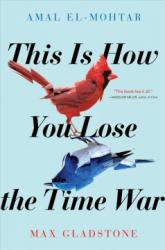
This Is How You Lose the Time War is a correspondence set throughout the whole of time, between two people on opposite sides of an eternal war. Red is a member of the Agency, a stark, metallic technotopia wielding bionic creations to tear time into place. Blue is a part of the Garden, an organic monolith determined to sink its roots into every part of time. The two of them are the best of the best, clashing invisibly over and over through time and space. When one of them leaves a letter, it begins a conversation throughout time, one that will change both of them, and the world, forever.
This book was a phenomenal read. It was a difficult thing to work through, something that refused to hold your hand and guide you through the sudden shifts and strange situations. But after drowning for a little while, everything starts falling into place, and soon you can't tear yourself away from the pages. The prose was brilliant, bringing every place and century and emotion vividly into focus. The characters are endearing and heartbreaking, and their development as they grow to understand and care for each other is profound. The storylines were vivid and fascinating, creating a whole new meaning to "the butterfly effect." Even the world building, as intentionally vague as it is, is still understandable and entrancing. I honestly don't know what it is that made me obsess over this book. Maybe it was the evolution of the characters, transforming from hellbent killers to cautious friends. Maybe it was the distinctiveness of the two characters voices, made all the more special since both sides of the story are written only by their given author. Maybe its the fascinating world around the characters, the future dystopias and steampunk cities and sand swept temples. I don't know what it is, but its one beautiful, wild ride.
From what I can tell, most people either love or hate this story. The ones who love it give gushing reviews not dissimilar to mine. The ones who hate it call it confusing, obtuse hogwash that doesn't properly develop its world or characters enough to be compelling. I can't tell what side of the spectrum anyone is going to fall on, but I know that everyone should give this a chance. All in all, I recommend this book for anyone in the mood for strangely poetic science fiction, star-crossed enemies, or an examination of a universe that can be forever changed by the beating of wings.
Reviewer Grade: 12
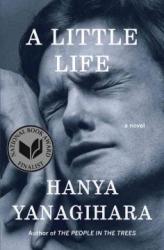
This book is very heavy and grim, but Hanya Yanagihara gives a detailed insight into living with disabilities, mental illness, and addiction. I became attached to the characters from the start. Four young men- Jude, Willem, JB, and Malcom, have been best friends since being college roommates in New York, but their individual lives and struggles make it complicated to work through their mid-life crises. Despite the grief and somber moments in A Little Life, I appreciated the resilient mentors that the four, especially Jude, had. It had a loving message of always having a support system somewhere even if it doesn't feel like it, and that your past doesn't define you- your present choices do. However, the ending was open ended and left a lot for me to ponder over later. I'd recommend this if you like more somber, down to earth books (and if you're a fast reader, because this book took forever to read!)
Grade 12
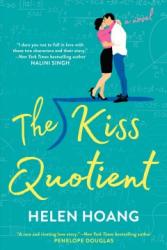
I appreciated a more realistic, but equally heartwarming, romance novel to break up the many cookie-cutter books of the genre. In The Kiss Quotient, the main character Stella seeks advice to find a romantic partner. It's only a matter of time before the man who agrees to help makes her reconsider who she is looking to impress. Stella's witty lines and her experience with Asperger's were interesting to read about and made me appreciate the romantic scenes even more because not every party or conversation went as expected. It was also cool to follow a main character that is self-confident and extremely brilliant. Nothing particularly stuck out to me as negative about the book, but it was fast-paced and surface level which just isn't my favorite kind of book.
Grade 12
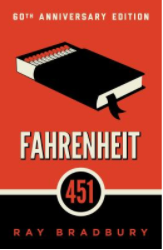
Fahrenheit 451 by Ray Bradbury is a dystopian novel written in 1953. Although some of the concepts and references are harder to understand due to when the story is written, it still holds many good messages relevant today. In this novel, books are banned, and firefighters burn houses with books inside instead of saving them. They are the protectors of happiness because books make people unhappy. Fahrenheit 451 follows a fireman, Guy Montag, as he starts asking questions about his job and society. This novel has many hidden meanings and is worth the time to read. The author does a beautiful job of keeping the writing and concepts simple enough for younger audiences. Overall, I would give it a five out of five stars.
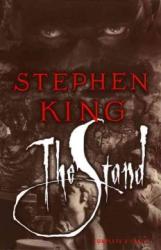
The Stand by Stephen King is uniquely a classic tale of good and evil facing off. This novel follows sundry people in a world after the deadly flu, which kills most of the population. While the remaining population is drawn to two people, one represents evil and the other good. The question that readers will be left with is: who will win? This question remains as various characters are introduced who are relatable and could pass for real people. The characters face many challenges, romance, action, adventure, and so much more. The ending to this stunning book could not be predicted and will keep any reader guessing. As with any Stephen King book, the writing style is distinct and will not be boring throughout the novel. It is a peephole to 1978 with vocabulary and culture. The Stand will not disappoint anyone willing to take on the challenge of a long, complex book. Overall I would give it a five out of five stars.
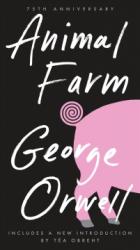
This book was pretty good. It was a little harder to get into than I thought it would be. The plot of the story was all about these animals on a farm, and how they wanted to have equality with the farmer. It is an old book that was written in 1945, but I thought it was really crazy how it is similar to some of the modern day issues the world is facing. My big sister has read it and we talked about it a lot, I think it is a better book for adults than for teen agers (I'm 14). The ending was not what I expected.
- almost 9th grader
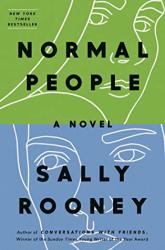
Normal People by Sally Rooney beautifully follows Marianne and Connell’s on again off again relationship. I really loved this book and I felt as if I was there growing with the characters. This story does not follow much of a plot, it is more about watching Marianne and Connell grow and develop as people. Rooney addresses mental health and abuse and the way Marianne and Connell were always there for each other literally makes me scream. The story begins when they are in high school with Connell being a well liked soccer player and Marianne being pretty much the opposite. It follows them through college and all their ups, downs, mistakes, and triumphs. This is a fairly easy read and I was able to finish it in no time at all.
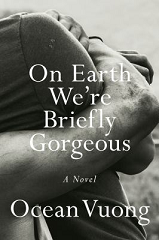
On Earth We're Briefly Gorgeous is a fictional autobiography written by Vietnamese-American poet Ocean Vuong. It is written in the form of a letter from a Vietnamese-American son to his illiterate mother.
To me, it was a surprise to hear that this novel was a work of fiction. The scenes constructed were so raw and real and written with so much emotion, that I automatically figured that this was a memoir. However, I later discovered that this book was fiction, with a couple of truths sprinkled in. I really loved the format that Vuong decided to use in this book because the letter format felt very lyrical and poetic at times. The book was refreshing and easy to follow, as opposed to the topics discussed in the book. As an Asian-American myself, there were many topics addressed in the novel that I could really sympathize and relate with, and while the subjects addressed could get pretty heavy and difficult to read through at times, I was grateful that Vuong took it upon himself to shed some light to many real issues and experiences. While I personally enjoyed the lyrical writing and could sympathize with the difficult subjects, I wouldn't recommend this book to everyone. There are many scenes in the novel that could be triggering and too much to handle, and even I felt like I had to put down the book a few times to get a break. I would recommend that before anyone decides to read this book, they should look up the content and trigger warnings. However, those that do decide to start this novel will definitely not be disappointed.
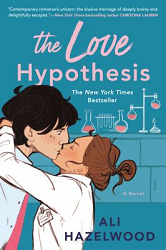
The Love Hypothesis is a cute romance novel that takes place in an academic setting. Olive, our protagonist, is a PhD STEM student attending Stanford, and Adam, her love interest is a professor at the college. I was initially a little hesitant about this book because while the age gap between Olive and Adam isn't concerning, their power dynamic is. Conveniently, however, it is revealed that Adam is not one of Olive's professors and manages another section of students. Even though Adam and Olive were never really "teacher-student," it still made me a little uneasy, especially since the two attend the same college. The novel basically establishes its plot through Olive and Adam having a fake relationship together. Adam needs this fake relationship to convince his higher-ups that he's not leaving Stanford and has put down roots, in order to unfreeze funds needed for his research projects. Olive, on the other hand, needs a fake relationship to convince her best friend Ahn, that she has no feelings for a boy she had gone out on a couple of dates with, after realizing Ahn is interested in the same boy herself. In order to persuade Ahn to pursue her feelings, Olive strikes up this fake-dating deal with Professor Adam Carlsen, thus leading the two of them into a real future together.
The Love Hypothesis, in my opinion, has everything critical for a good, cheesy, romance. The fake-dating trope, many sweet situations, and a love interest who seems cold and cruel on the outside, but turns out to be a softie just for Olive. While the novel may have the right ingredients for a swoon-worthy romance, however, there was something missing. Olive as a protagonist was a very 2d character and was someone I could not find myself relating to or even being interested in. While it was refreshing to see a female woman lead pursuing a career in STEM, there was nothing else all that interesting about Olive. I also didn't like the author's choice of using the topic of sexual assault only as a plot device, in order to bring the story forward and the characters closer.
On the other hand, Adam was a classically written love interest. Strong on the outside, and soft on the inside, he had all the criteria needed for a typical male lead in a romance novel, and while it may seem overdone to some, I think Adam was a great portrayal of such traits.
Overall, The Love Hypothesis was an interesting romance novel, and I enjoyed its academic setting and some of the scenes involved. However, there were a couple of aspects of the story that could have been tweaked to make the story more enjoyable. In my opinion, many romance-lovers would probably enjoy this novel, but I found myself wanting more.
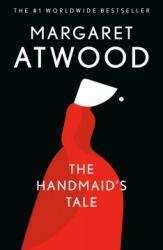
The Handmaid's Tale, written by Margaret Atwood, is a fictional account of Offred, who is a handmaid that lives in a dystopian society. A handmaid is a woman whose purpose is to have a child. Offred is conflicted with her job; she is separated from her lover, Luke and her child, thinking that they are dead but hoping they are alive. The new government slowly took away power from females until the females are essentially powerless. I chose the book because my Aunt recommended it to me. One thing I liked about the book was that the ending was essentially left to the reader's judgment. As a male, it gave me helpful insights to events that are happening right now that I never would have thought about.
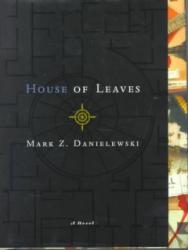
House of Leaves is a story within a story within a story. In short, it is a collection of writings, put together by an amateur tattoo artist after retrieving the notes from a dead blind man's apartment, notes about a documentary that may or may not have existed, a documentary that details one family and their house that is far bigger on the inside than it is on the outside. It is a desperate mess, a mile-high pile of unreliable narrators' unreliable writings collapsing in on themselves. It is a horror, not about a haunted house or a monster in the dark, but about the things that haunt us and the monsters inside our minds. It is a book that pushes the idea of what a book can be. It is gibberish, illegible, unreadable. And it is one of the most gripping books I have ever read.
I was glued to this book when I got it. It was one of the first real horror books I have ever read, and yet it betrays every idea of what horror should be. It is long and rambling and pretentious, going off on random tangents and strange digressions at the drop of a hat, but it still made my skin crawl. After I first bought the book, I quickly realized that I could not read it when my parents weren't home. It's something about the abruptness of horror after so long without it, or maybe its the unsettling words before that put you in the headspace where every shadow looks like a death omen. It's likely also something about the way the book chooses to directly address the root of all fears. It isn't about a house invasion, it's about the primal fear that comes when the comforting becomes unsafe. It isn't about surviving in a dangerous or extreme environment, it's about the bone deep terror of being somewhere you don't belong. It isn't about a monster, it's about the monstrous things this world has to offer, and how that monstrosity can creep into our very bones. This can be seen in the way the horror of the book is never named or explained. There is no ritual or legend, no handy expert or trusty guide. Even if a character manages to escape the horror, the horror still exists, because it has always existed.
Despite the beautiful prose, rich imagery, and startling effect this book creates, there are definitely some problems. The main issue is the inherently illogical structure and plot of the novel. This is obviously intentional on the authors part, since the book, and its characters, are meant to be a challenge to understand. The book is filled with rambling, nonsensical footnotes that can take up pages at a time. Words will go in different directions, appendices will stretch on for hours, entire chapters will be devoted to academic nothingness. This strangeness also weaves its way into the plot. While the documentary's story is mostly straightforward (although it, too, dissolves near the end) the ramblings of the amateur tattoo artist bringing the story together are crude, strange, abrupt, and often incomprehensible. There is a lack of catharsis, of any sort of understanding of most of the characters, and this can be very confusing and frustrating.
All in all, this book was a difficult yet rewarding read. I'd definitely recommend it for older readers, and would instruct any attempting to read it to get the physical version, read however feels comfortable, and go to the appendices when directed. I'd also recommend it for any lovers of horror, mystery, or a story in unique format.
Reviewer Grade: 12
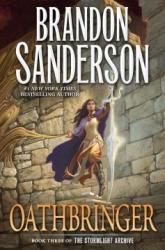
Oathbringer is the third installation in the amazing Stormlight Archive. With their homeland overrun by "Voidbringers" (or is it...🤔), Dalinar Kholin and co must find a way to end this Desolation without being wiped from Roshar, and without the help of the Heralds of the Almighty, or the Almighty himself. Urithiru, the city of the Knights Radient, has a new, unwelcome occupant that is mimicking acts of violence that happen in the tower city. The city conceals more knowledge that no one knew, including an unpleasent fact about humanity's orgins on Roshar, their "homeworld".
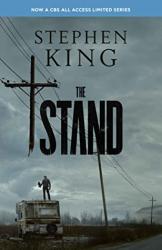
One of King's earliest and critically acclaimed books, a superflu ravages the planet, leaving a minuscule remainder of the population to pick between two opposing factions.
This book was a lengthy trip to follow, but it was pretty good. The characters were my favorite part of the story, as most of them were nuanced and developed. Seeing them interact with each other and/or their environment really pulled me in. The story, overall, was also good, but there were spots that didn't bring me the same enjoyment. The ending was anti-climatic and seemed forced, and it didn't flow with the setup before hand. Speaking of flow, the story was very slow. Characters acted and did things, but they also didn't. After the beginning, nothing really happened conflict wise. It all seemed like set up without much driving force aside from the attraction to the two fractions. In context with the story, it makes sense, but it still seemed boring at points where characters either weren't developing or were just there for a purely plot reason. Still recommend a read (especially with how it connects with his other works), but not the best I've read.
Reviewer's Grade: 11
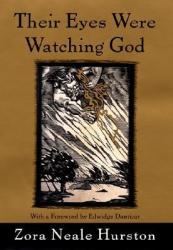
Their Eyes Were Watching God, written by Zora Neale Hurstson, is a contemporary fiction novel regarding the tale of Janie Crawford and her quest to find love. I like how the book introduces the characters in the beginning, after Janie's journey to find love, and then Janie tells her best friend about how she ended up where she was. Originally, her grandmother wed her to a man she was uninterested in. In fact, she was so uninterested in her husband that she ran off with another, more exciting man. The more she stayed with the exciting man, named Joe Starks, (she eventually married him), the more he hurt (physically/emotionally) her. Later, Joe dies, and she has little to no remorse over his death. A couple months later, she meets Tea Cake, and eventually falls in love with him. The part that I don't like about this book is that Tea Cake has a lot of warning flags, but they all seem to fly over Janie's head. I don't know if the author intended for the main character to be foolish or not, it simply shocked me how willing Janie was to devote herself to Tea Cake.
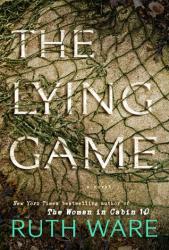
In this book, you follow four childhood friends (shown from the perspective of Isa Wilde) as the secrets of their past actions come back to haunt them.
I was intrigued by the premise of the story, but for the most part, the story was pretty boring and predictable. The concept of a lying game in the past was interesting and I was excited to see how would play into the story. The secret about what happened almost 20 years earlier seemed really overplayed to me. What actually happened didn't really seem as much of a big reveal as I thought it would be. The final twist at the end of the book wasn't anything special and I figured it out pretty quickly compared to other stories. The ending was anti-climactic; by the end of the story, I wasn't invested. The characters were fine: originally, they seemed relatable and human for the most part, but as the story progressed, I grew to dislike a couple of the main characters. Their actions seemed abnormal and irritating, and even within the context of the story, I still couldn't get over it. This could have been a better book, but the payoff wasn't there.
Reviewer's Grade: 11
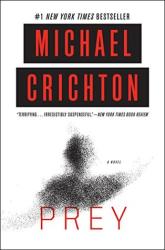
Here, you follow Jack Forman as he wages through his wife's unusual behavior and the nanotechnology her company created and developed.
For my first Crichton novel, I really enjoyed it. Watching Jack as he waded through his suspicious and the dangers he faces was a thrill to watch. While the characters themselves felt a bit bland, the plot, scientific mystery, and thriller aspects of the story make up for it. Learning about nanotechnology and different parts of programming was also fun to read, even if I didn't understand all of it. The pacing of the novel was done pretty well, from the beginning with Jack's wife, to the her place of work later in the novel. The way the danger was presented and changed was done well and kept me on my toes until the resolution. I recommend this for those who like thrillers and/or sci-fi.
Reader's Grade: 11



 Ruth Holley Library will be temporarily closed for approximately one week starting Mon., Dec. 2 to complete roof repairs.
Ruth Holley Library will be temporarily closed for approximately one week starting Mon., Dec. 2 to complete roof repairs.